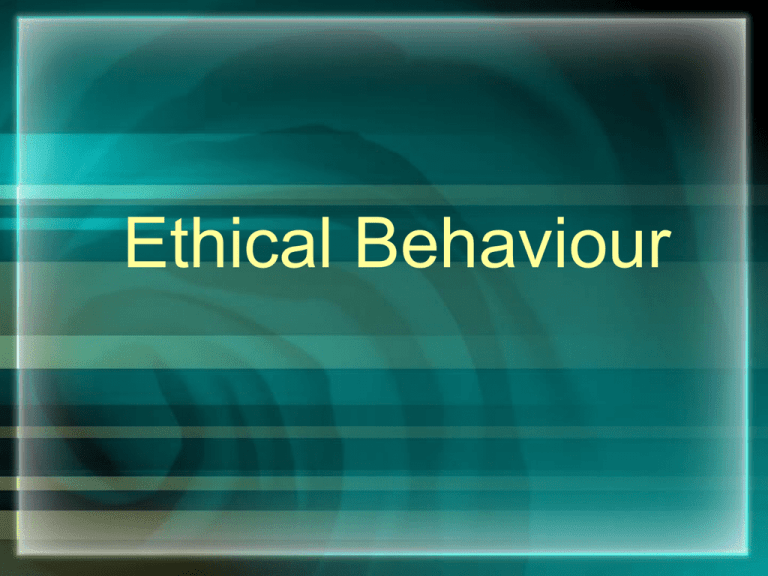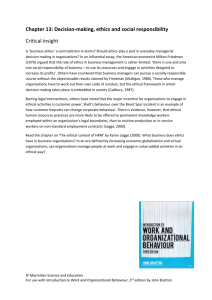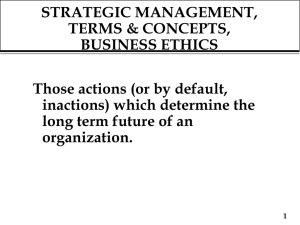3.1 Ethical Behaviour
advertisement

Ethical Behaviour Ethical Behaviour and Social Responsibility Planning ahead—study questions: 1. What is ethical behaviour? 2. How do ethical dilemmas complicate the workplace? 3. What types of things might corporations do to show that they have a social conscience? 4. Is it a corporation’s responsibility to be socially aware or should they be a strictly profit-driven entity? What is Ethical Behaviour? Ethics • Code of moral principles. • Set standards of good and bad and right and wrong. Ethical behaviour • What is accepted as good and right in the context of the governing moral code. Law, Values, and Ethical Behaviour • Ethical behaviour should also be legal in a just and fair society. • Legal behaviour is not necessarily ethical behaviour. • Personal values help determine individual ethical behaviour. Ford Motor Company Case Study • Read the case study on Ford Motor Company and answer the following questions: 1. From a corporate perspective, what are some of the pros and cons of Ford’s decision to not recall vehicles? What was their logic? 2. From a social perspective, what are some of the pros and cons of Ford’s decision to not recall vehicles? • From a corporate perspective, what are some of the pros and cons of Ford’s decision to not recall vehicles? What was their logic? • PROS: More cost effective (on paper), no recall = minimal negative publicity, build/sell more Pinto’s, money saved can be invested elsewhere (production facilities, new technologies, etc.) • CONS: Greed vs. human life, horrible image for Ford, questionable quality of vehicles, lawsuits and legal fees, low employee morale • • • From a social perspective, what are some of the pros and cons of Ford’s decision to not recall vehicles? Pros: reduced layoffs of employees working on the Pinto, survivors made a lot of money from lawsuits, cars were less costly, this case provided a good example of corporate corruption to society, providing jobs Cons: caused deaths and injuries, unethical – what else are corporations hiding from society? Views on Ethical Behaviour Utilitarian view of ethics: greatest good to the greatest number of people. Individualism view of ethics: primary commitment is to one’s long-term selfinterests. Views on Ethical Behaviour Moral-rights view of ethics respects the fundamental rights of all people. Justice view of ethics fair and impartial treatment of people according to rules and standards. Cultural Issues in Ethical Behaviour Cultural relativism: • Ethical behaviour is always determined by cultural context. Ethical imperialism: • Behaviour that is unacceptable in one’s home environment should not be acceptable anywhere else. Figure 3.2 The extremes of cultural relativism and ethical imperialism in international business ethics. Source: Developed from Thomas Donaldson, “Values in Tension: Ethics Away from Home,” Harvard Business Review, vol. 74 (September-October 1996), pp. 48-62. Management Fundamentals - Chapter 3 11 How Companies Can Respect Values Respect for human dignity Create culture that values employees, customers, and suppliers. Keep a safe workplace. Produce safe products and services. Respect for basic rights Protect rights of employees, customers, and communities. Avoid anything that threatening safety, health, education, and living standards. How Companies Can Respect Values Be good citizens Support social institutions, including economic and educational systems. Work with local government and institutions to protect environment. Ethical Dilemmas • Ethical Situations






